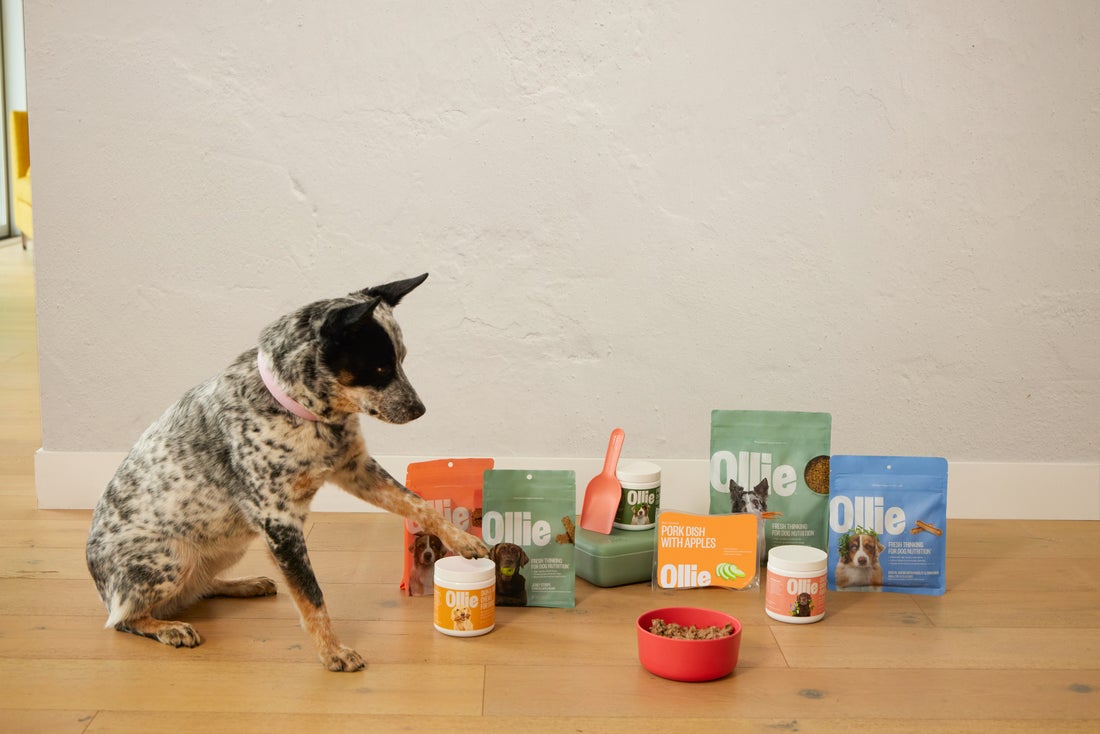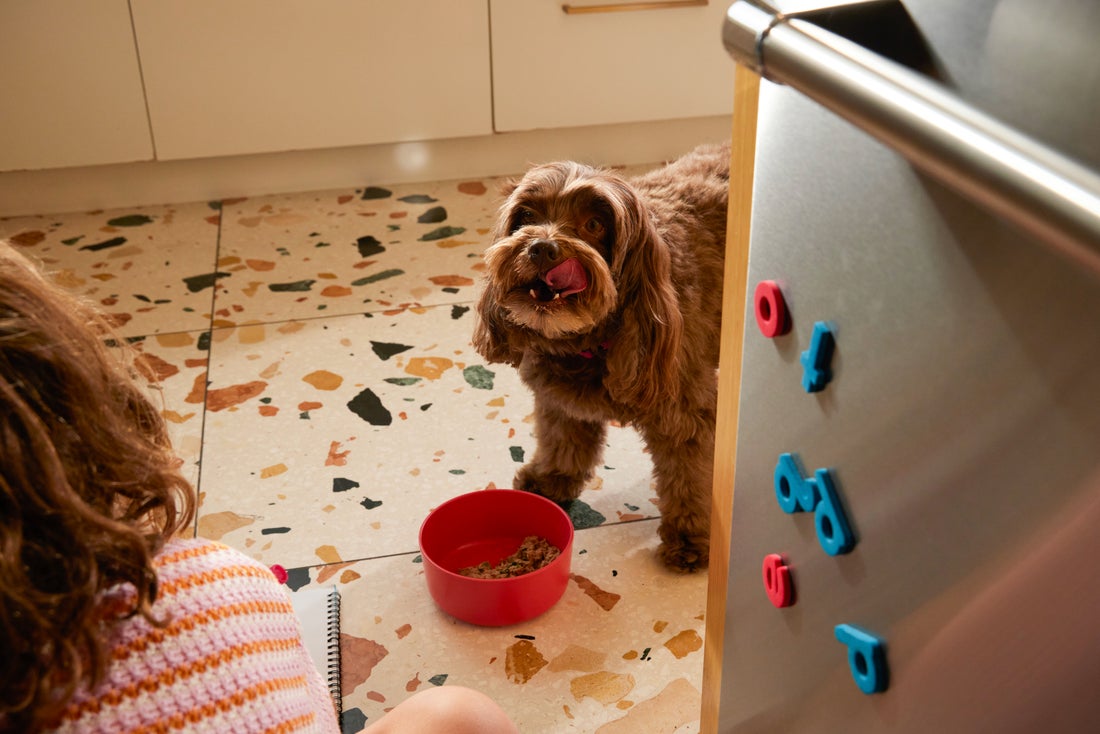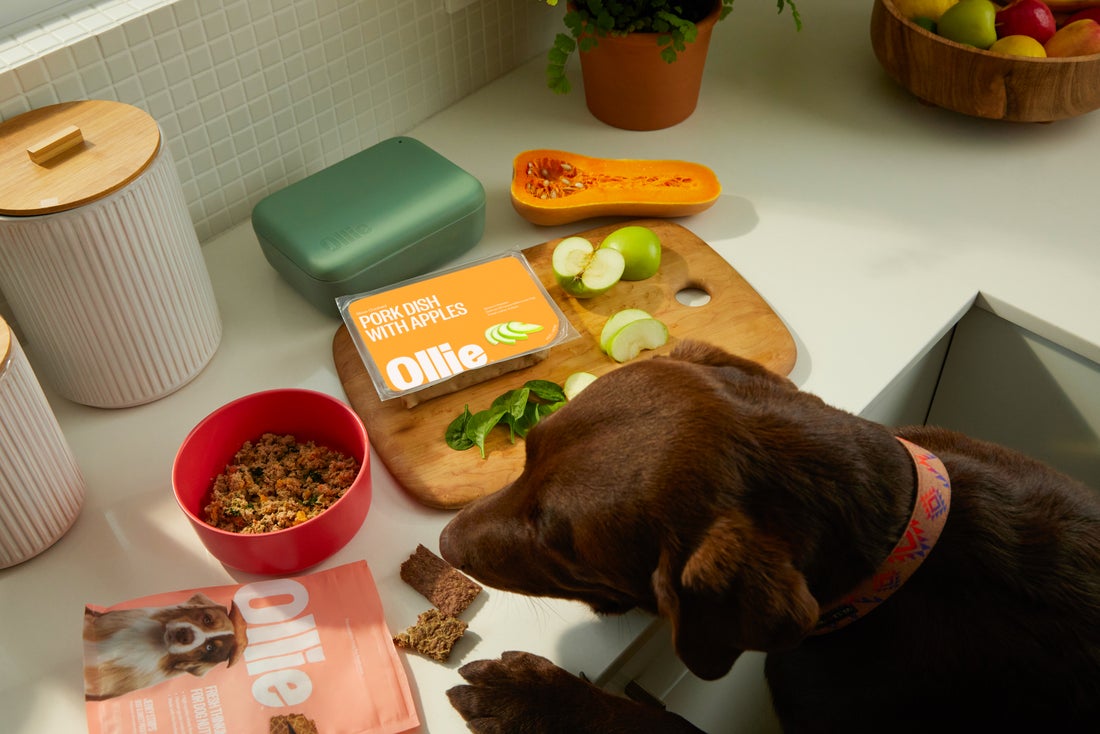Hey Ollie blog readers! We’re offering you an exclusive 60% OFF your starter box! Try now!
Every dog owner knows that sudden, jarring sound—your pup starts coughing, then gagging, and you brace for what’s coming next. Whether it happens in the middle of the night or during a walk, it’s unsettling and raises the same question: Is this normal, or should I call the vet?
Dogs cough and gag for all sorts of reasons. Sometimes it’s something minor, like a tickle in the throat or excitement after exercise. Other times, it could be a sign of something more serious—like kennel cough, a collapsed trachea, or heart disease.
In this guide, we’ll break down:
- What causes dogs to cough and gag
- What it means if your dog has a dry cough that ends in gagging
- When it’s safe to monitor at home
- When it’s time to call the vet
Understanding what to watch for can give you peace of mind—and help you act quickly when it matters most.
Why Is My Dog Coughing and Gagging?
Coughing and gagging in dogs often go hand in hand—and while it can sometimes be harmless, it may also signal an underlying issue that needs attention. In most cases, the gagging is triggered by irritation in the throat or airways, either from something your dog inhaled, inflammation, or an infection.
Your dog might cough first, then gag as a reflex to clear mucus or discomfort from their throat. This can happen occasionally, especially after drinking too fast or exercising. But if the coughing and gagging become frequent, harsh, or are paired with other symptoms like fatigue or trouble breathing, it could point to something more serious like kennel cough, tracheal collapse, or even heart disease.
Coming up next, we’ll break down the most common causes—so you can better understand what’s normal, what’s not, and when to call your vet.

There are many reasons your dog might gag, or cough other than the occasional middle-of-the-night digestive issue. We looked at some of the most common – and how you can help them if they need it.
Six Common Causes of Dog Coughing and Gagging
1. They have kennel cough on another respiratory illness
If your dog is coughing and gagging it might be a sign of kennel cough or another respiratory illness. Kennel cough is highly contagious and spreads quickly through places where a lot of dogs hang out – like doggie daycares, shelters, and dog parks. Dogs who visit the groomer can even pick it up if they come in contact with a pup who is infected.
This is why it is important for dogs who spend time in congregate settings to be vaccinated at least annually. If you suspect your dog is gagging (and coughing) due to kennel cough, you should call your vet to discuss treatment options, and ensure your dog is kept away from other pups until they’re no longer contagious – Usually, about one week after all symptoms have subsided.
Since there are many other resperatory illnesses dog’s can contract, if your dog has symptoms it’s important to get them checked out so you can make sure they’re on the path to feeling better, fast!
2. Something is trapped in their airway
If your dog is coughing or gagging and it started while they were eating, chewing on a bone, or playing with toys, they could have gotten something stuck in their airway.
You’ll want to monitor your dog to ensure they’re eating, drinking, and going to the bathroom normally – as issues here can be a sign of a blockage.
If this is a rare occurrence, and it resolves quickly there is probably nothing to worry about. If your dog is frequently coughing or gagging after eating, drinking, or playing with toys it may be cause for concern. See your vet for an exam to rule out a blockage or a tumor that could be causing things to get stuck. If your dog is choking, you may need to administer the Heimlich maneuver, which isn’t performed the same as in humans.
3. They drank too quickly
While healthy hydration is very important to your pup’s overall health, it is possible for them to drink too quickly. If this is the case, it might cause your dog to gag or cough. This is not serious if it only happens occasionally and only lasts a few minutes. If your dog is consistently drinking too fast you may need to control their water intake so they don’t drink too quickly.
4. They are experiencing nausea
If your dog is nauseous, they may show signs of dry heaving. This can happen both before and after your dog throws up. Occasional vomiting may not be a cause for concern, but if your dog is going more than 24 hours without being able to even keep water down or has any other symptoms like lethargy or a fever, you should call your vet.
If your dog does vomit, you should withhold food and water for a few hours (ask your vet how many) and then start by reintroducing water slowly. You can offer a bland diet including things like lean ground beef, rice and sweet potatoes.
5. They are excited
If your dog gets too excited they might gag. You can help them work through their excitement and calm down. If they don’t calm down and continue to gag, you might want to end the activity (or whatever is causing the excitement) or give them a quite place to relax.
6. They have a collapsed trachea
A collapsed trachea happens when the cartilage “rings” of a dog’s trachea weaken causing their windpipes to collapse in when they inhale. While it is not “curable” it can be treated with weight loss (if the dog is overweight), using a harness in place of a collar, and anti-inflammatory medications. In some cases, your vet might also prescribe a steroid.
What To Do If Your Dog Is Coughing or Gagging – When To Visit A Vet
If your dog is gagging and throws up some white or yellow foam and it’s an isolated incident (they seem absolutely fine and don’t throw up again) you might not need to have them see a vet. But, if the gagging is becoming more frequent or your dog is experiencing other symptoms, seems lethargic or something just seems “off” it’s a good idea to call the doctor.
Based on your dog’s symptoms, severity, and medical history your vet may want to run some tests to rule out illness, or something in their airway.
While gagging and coughing can be a very normal part of life like it is for humans, if you’re concerned about the frequecy or your dog is showing other signs of illness or discomfort, it’s a good idea to seek medical attention.
Coughing vs. Gagging vs. Vomiting
If your dog starts making strange sounds or movements, it can be hard to tell what’s going on. Are they coughing? Gagging? Throwing up? These reactions can look similar at the moment—but each one has different causes and levels of concern.
Here’s how to spot the difference between a cough, a gag, and a vomit—and what each one might mean.
Coughing
What it sounds like: A sharp, forceful, sometimes repetitive noise that comes from deep in the chest or throat.
What it looks like: Your dog may stretch out their neck, keep their mouth slightly open, and make a hacking or honking sound.
Common causes:
- Kennel cough
- Tracheal collapse
- Heart disease
- Allergens or irritants (like smoke or dust)
Expert Note: A dry cough is often more concerning than a wet one, especially if it’s frequent or paired with gagging, lethargy, or breathing trouble.
Gagging
What it sounds like: A retching or throat-clearing noise, sometimes with a gulping or heaving motion.
What it looks like: Your dog may extend their neck, appear to swallow repeatedly, and make a motion like they’re trying to clear something from the back of their throat.
Common causes:
- Throat irritation
- Mucus buildup
- Reverse sneezing
- Early signs of tracheal collapse
- Foreign object in the airway
Important to know: Gagging without vomiting could still signal airway issues or inflammation, especially if it happens often.
Vomiting
What it sounds like: Rhythmic retching followed by the forceful expulsion of stomach contents.
What it looks like: Your dog crouches or tightens their belly, retches several times, and then brings up food, bile, or foam.
Common causes:
- Dietary indiscretion (eating garbage or table scraps)
- Motion sickness
- Gastrointestinal upset
- Infections or toxins
Important to know: Vomiting more than once in a short period—or vomiting alongside lethargy, diarrhea, or refusal to eat—warrants a vet visit.
Expert Recommendation: When in doubt, take a short video of the behavior. Your vet can often tell what’s going on just by seeing it—and that small step can lead to faster diagnosis and treatment.
Dog Coughing or Gagging Treatment Options
The right treatment for a coughing or gagging dog depends on what’s causing the symptoms. In some cases, mild irritation clears up on its own. But if your dog is coughing frequently, gagging after every meal, or showing other signs of illness, it’s time to take action.
Here’s how veterinarians typically approach treatment based on the underlying cause:
If It’s a Respiratory Infection (Like Kennel Cough or Pneumonia)
- Antibiotics or antivirals may be prescribed, depending on whether the infection is bacterial or viral.
- Cough suppressants can provide relief in non-productive (dry) coughs, but they’re not used for all cases.
- Isolation and rest are important to prevent spreading infection to other dogs.
Signs to watch for: Runny nose, sneezing, fatigue, a honking cough, or coughing that worsens at night.
If It’s Tracheal Collapse
- Weight management is key—extra weight puts pressure on the airway.
- Switch to a harness to avoid irritating the throat with a collar.
- Bronchodilators or anti-inflammatories may help reduce coughing episodes.
- In advanced cases, surgical intervention or stenting may be needed.
Common in small breeds like Yorkies, Pomeranians, and Chihuahuas
If It’s Related to Heart Disease
- Cardiac medications such as diuretics, ACE inhibitors, or beta-blockers help manage symptoms.
- Routine monitoring and diagnostics like x-rays and echocardiograms are important.
- A low-sodium diet may be recommended to reduce fluid retention.
Look for coughing that worsens at rest, along with fatigue or rapid breathing.
If It’s Due to Allergies or Irritants
- Remove triggers like scented sprays, smoke, dust, or pollen from your dog’s environment.
- Consider a hypoallergenic or limited-ingredient diet if food allergies are suspected.
- Antihistamines or anti-inflammatories may help with chronic throat irritation.
Symptoms may come and go, and often worsen seasonally or after environmental changes.
If It’s a Choking or Foreign Object Emergency
- Check your dog’s mouth and throat only if it’s safe to do so.
- If your dog can’t breathe or is pawing at their mouth, get to a vet immediately.
- Avoid trying to remove objects yourself unless you’ve been trained to do so.
Don’t wait—airway blockages can become life-threatening within minutes.
How Ollie Can Help
Some cases of gagging or coughing are linked to sensitivities, allergies, or low-quality ingredients in food. At Ollie, we create fresh, vet-formulated meals made with real meat, vegetables, and zero fillers—designed to be gentle on the digestive system and immune-friendly.
Take Our Personalized Dog Food Quiz!
The Ollie blog is devoted to helping pet parents lead healthier lives with their pups. If you want to learn more about our fresh, human-grade food, check out MyOllie.com.
Tagged As:

The nutrition your dog needs,
the food they want.

Enjoying our articles? Subscribe our Newsletters and get new articles directly to your inbox
You might also like
18 July 2025
6 MINS READ
Can You Mix Fresh Dog Food With Kibble?
If you’re feeding your dog kibble but want to upgrade their bowl, you’re not alone. Many pet parents ask if they can mix fresh dog food with kibble to get some of the benefits of fresh food wi…
by Ollie Pets
18 July 2025
5 MINS READ
Does Fresh Dog Food Help With Weight Loss?
If you’ve noticed your dog carrying a few extra pounds, you’re not alone. According to the Association for Pet Obesity Prevention, over half of dogs in the U.S. are overweight or obese. Extra …
by Ollie Pets
18 July 2025
4 MINS READ
Is Fresh Dog Food Cooked or Raw?
When you hear “fresh dog food,” it’s normal to wonder if that means raw meat or something cooked. After all, fresh just means it’s not dry kibble or canned food packed with preservatives. …
by Ollie Pets







